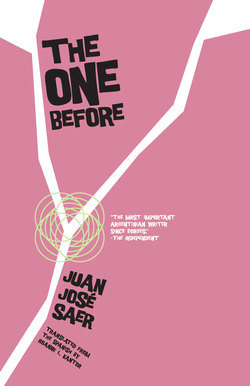Читать книгу The One Before - Juan José Saer - Страница 14
На сайте Литреса книга снята с продажи.
ОглавлениеThe Interpreter
Now I am walking along the shore of the ocean, upon sand that is smoother and more yellow than fire. When I stop and look behind me, I see the border of my crisscrossing footprints intricately traversing the beach and coming to rest just beneath my toes. The white, intermittent border of foam separates the yellow expanse of the beach from the sky-blue of the water. If I look at the horizon, I feel that I will begin to see, again, the butchering boats advancing from the ocean toward the coast, black dots at first, then strained filigrees, and finally pot-bellied casks supporting the sails, and a forest of masts and cables slipping taught out front, gradually revealing a throng of active men. When I saw them, I closed my eyes against the shine of their stony breastplates, and the sound of metal and of harsh voices deafened me for a moment. I was ashamed of our rough and humble cities and I understood that they counted for nothing, nor did Ataliba’s gold and emeralds (which they pulverized with hammers searching for the meat, as one does with a nut), nor the huge paved corridors walled with silver, nor our immense stone calendars, nor the imperial guard that reappears, time and again, on our façades, in the garments of the court and on our earthenware. I saw an open stream of abundance and glory flow forth from the sea. With a cross, the butchers touched the forehead of the child I used to be, gave me a new name, Filipillo, and then, slowly, they taught me their language. I made it out, gradually, and the words advanced toward me, Filipillo, from the horizon where they filled in, layered upon each other to become, again, like the boats, black dots, black iron filigrees, and finally a forest of crosses, symbols, masts, and cables pouring out from a boiling mound like terrified ants from an anthill. Then I was no longer the naked child whose eyes sparkled with the metal of armor and whose ears echoed, for the first time, with the roar of the sails, and I began to be Filipillo, the man endowed with a double tongue, like a snake’s. From my mouth came the blessing, the poison, the ancient word my mother used to call me in the afternoon, from among the bonfires and the smoke and the smell of food wafting along the streets of the brick-colored city, and those sounds that echo in me like in a bottomless, empty well. My life is always swinging between the words my voice rips from my blood, and the learned words my mouth devours greedily at another’s table, tracing a parabola that sometimes erases the line of demarcation. I feel as if I am passing through a region of alternately nocturnal and diurnal zones, like a rooster crowing at an unearthly hour, like the jester who improvises for Ataliba, before the laughter of the court, a song not of words, but simply of sound.
When the butchers judged Ataliba, I was the interpreter. Words passed through me like the words of God pass through a priest before reaching the populace. I was the white line, unstable, agitated, that separated two formidable armies, like the border of foam separating the yellow sand from the ocean; and my body was the feverish loom where destiny was woven from a throng with the double needle of my tongue. Words flew like arrows and pierced me, reverberating. Had I understood the same thing they told me? Had I given the same thing I received? When my eyes, during the judgment, fell upon the blue breasts of Ataliba’s wife, breasts that might permit, perhaps, in the absence of Ataliba’s hand, a visit from my greedy fingers, had this disturbance disfigured the meaning of the words that resounded in the immobile enclosure? I’m sure of one thing: that my tongue was like a double tray upon whose elastic plates conspiracy and lies sat in comfort. I felt the roar of the two armies, like two oceans joining, an ocean of blood and a foreign ocean of black water, and now, in the afternoon, I walk along the beach, an old man bent under the vault of enemy voices that extend interminably over my ruins, consumed by the jungle. Like one sucked into a stream of water, only to be gargled and spit back out again, I didn’t die with those who died when I handed down the sentence, but nor do I live the fierce life of the butchers whose voices are carried to me on the wind at night, when I go to sleep in the jungle.
When the butchers began to build their city, they made a thick wall of adobe and painted it white. But one part of it crumbled and they abandoned it. That white wall remained in the middle of a bare field, and at noon the light shines on its white surface pockmarked by the open air. Sometimes I sit on the ground and look at it, for hours. I think that the butcher’s language, for me, is like this wall, compact, useless, meaningless, and I am blinded when the light reflects against its corrupt and arid face. A wall to scratch until my fingers bleed, or to crash against, but with no house behind where I could go in and enjoy the shade. I am nothing but an old Indian wandering the jungle in silence, among the ruins, and I can no longer hear, in the afternoon, my mother’s voice calling me home from among the bonfires and the smoke and the smell of food wafting along the streets of a brick-colored city that extended to the sky.
